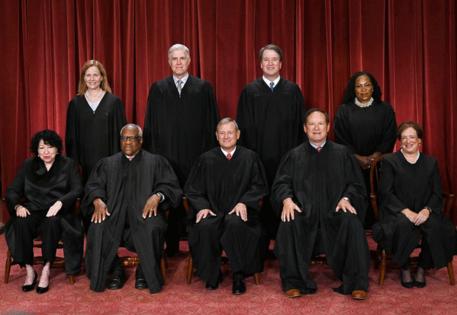Supreme Court sounds skeptical of ending FCC program
Published in News & Features
WASHINGTON — A majority of the Supreme Court appeared reluctant Wednesday to wipe out a Federal Communications Commission program, voicing skepticism about arguments that Congress had ceded too much of its power to the agency.
In the two cases argued Wednesday, the justices questioned how they could deal with a lower-court decision that found the $9 billion Universal Service Fund violated the Constitution by running afoul of what’s called the “nondelegation clause” — a limit on how much power Congress can give up.
The cases are the first in years where the justices have pondered the nondelegation doctrine, and a ruling could require Congress to be more specific in its legislating or limit its ability to give agencies’ power at all, experts said.
Consumers’ Research, the conservative group challenging the constitutionality of the program, told the justices during oral arguments that Congress should be required to lay out specific limits when allowing agencies to raise money from the public.
“At its heart this case is about taxation without representation,” R. Trent McCotter, counsel for the group, said.
Justices Brett M. Kavanaugh and Amy Coney Barrett questioned the usefulness of setting such limits. “That seems a little bit hollow. That seems like a meaningless exercise,” Barrett said.
Kavanaugh pointed out that under McCotter’s argument, Congress could set a limit of $1 trillion or some other arbitrary amount and avoid a constitutional problem. “Then the question I think is, what exactly we actually accomplishing?” Kavanaugh said.
Congress passed a law in 1996 establishing the current USF, which collects and distributes money from telecommunications providers to subsidize service for populations and institutions that may not otherwise be able to afford connections. That includes the E-Rate program for schools and libraries as well as rural health care providers, Native American tribes and others.
The U.S. Court of Appeals for the 5th Circuit ruled that the combination of Congress’ unlimited grant of authority to raise funds, and the role of private parties in setting those rates, violated the constitutional restriction on Congress delegating its taxing power.
Acting Solicitor General Sarah Harris, representing the U.S., said that upholding that ruling would dismantle the USF program and unleash “chaos” across the government. Harris said expanding the nondelegation doctrine would create “a minefield for the U.S. code” as litigation swept through targeting various laws.
Harris pointed out that Congress has delegated broad power in the past for the president to assess tax rates, charge fees and levy tariffs “to raise revenue for no reason or whatever reason he deems appropriate.”
Justice Samuel A. Alito Jr. said he was concerned about how the court could rule against the structure of the USF program without causing chaos or inviting other lawsuits. Alito pushed McCotter to lay out a way the court could rule in his favor while minimizing such fallout.
“I’m quite concerned about the effects of a decision in your favor on the grounds you have been pressing this morning,” Alito said.
But Alito also said there is “pretty damning” evidence that the FCC has largely let the Universal Service Administrative Co., a nonprofit organization created by the FCC, run both the revenue collection and distribution of funds under USF. One of the grounds the 5th Circuit used to rule the USF program unconstitutional was the FCC’s relationship with USAC.
“Isn’t it really hard to say anything other than the fact that they have just rubber stamped whatever the USAC has told them?”
Justice Neil M. Gorsuch pushed the government to defend “a straight up tax without any numerical limit, any cap, any rate,” set in the statute.
“What’s unique about this case is we have a tax that is unlike any other tax this court has approved,” Gorsuch said.
Gorsuch said the wording of the law could be used to justify providing everyone in America with a Wi-Fi hotspot or Starlink account.
Harris responded that the law provides several limits on the FCC’s ability to provide services; they can only be ones that a majority of the country already has and only if the costs are “reasonable.” If the FCC went beyond those bounds it could be challenged in court, she said, and avoid a constitutional problem.
Justice Ketanji Brown Jackson said she was concerned about whether it was “democracy enhancing” to “allow judges to strike down popular-enacted law.”
“This could be the aggrandizement of power by the courts if we don’t have a really clear standard to step in,” Jackson said.
Paul Clement, representing a set of interest groups that intervened in the case, argued Congress included specific goals for USF to accomplish, and the FCC could not stray from those without running into legal problems.
“The restraints on this are not a definitive cap, but they are from the substantive limits in the program,” Clement said.
The justices are expected to issue decisions in the cases by the conclusion of the court’s term at the end of June. The cases are FCC et al. v. Consumers’ Research et al. and Schools, Health & Libraries Broadband Coalition et al. v. Consumers’ Research et al.
_____
©2025 CQ-Roll Call, Inc., All Rights Reserved. Visit cqrollcall.com. Distributed by Tribune Content Agency, LLC.







Comments